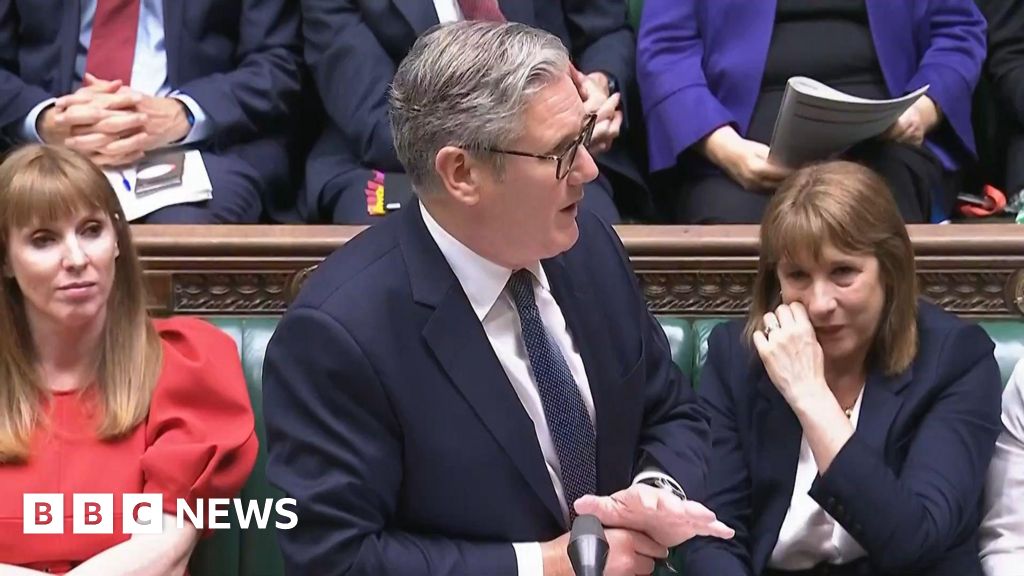Borrowing costs have surged sharply, and the pound has fallen after a tearful appearance by Chancellor Rachel Reeves in parliament. Reeves was at Prime Minister's Questions on Wednesday following the government's U-turn on plans to cut benefits. Markets reacted after her emotional state sparked speculation about her position in government. Sterling fell notably, down 1% against the dollar, although it has recently been trading very strongly. Borrowing costs also soared, in one of the biggest one-day moves since October 2022 when markets were in turmoil after Truss's mini budget, which eventually led to her downfall. The rise eased slightly after Prime Minister Keir Starmer's press secretary tried to quell rumours that Reeves might be replaced. "The chancellor is going nowhere, she has the prime minister's full backing", they said, although Starmer himself declined to give her a public show of support. But the rise in yields then resumed, with borrowing costs remaining elevated. The reversal of welfare reforms puts an almost £5bn black hole in Reeves' fiscal plans. That the rise, at least at first, was caused by the suggestion the chancellor might step down, suggests she retains market credibility. But the fact borrowing costs remain higher, suggests wider concerns about the government's Budget maths are starting to materialise. When asked why Reeves appeared upset, a Treasury spokesperson said it was a "personal matter" that had caused her distress. The movements in the pound and gilt yields are "a sign of fiscal stress, which the UK has had to weather before," said Kathleen Brooks, research director at XTB. The FTSE 250, which is more exposed to UK policies than the FTSE 100, closed down 1.34%.
Borrowing costs jump and pound falls after Reeves' tears
TruthLens AI Suggested Headline:
"UK Borrowing Costs Rise and Pound Declines Following Chancellor's Emotional Appearance"
TruthLens AI Summary
In a dramatic turn of events, borrowing costs in the UK have surged, and the value of the pound has fallen sharply following an emotional appearance by Chancellor Rachel Reeves during Prime Minister's Questions. Reeves' distress came in the wake of the government's unexpected reversal on plans to cut benefits, leading to significant speculation regarding her future in the government. The pound experienced a notable drop of about 1% against the dollar, a concerning shift considering its recent strength. This sudden market reaction mirrored one of the most significant one-day increases in borrowing costs since October 2022, a period marked by turmoil following former Prime Minister Liz Truss's mini-budget. Although Prime Minister Keir Starmer's press secretary attempted to reassure markets by confirming Reeves' position, stating, "The chancellor is going nowhere, she has the prime minister's full backing," Starmer himself refrained from publicly endorsing her, which may have contributed to ongoing market unease.
The reversal of welfare reforms has created an estimated £5 billion shortfall in Reeves' fiscal plans, further exacerbating concerns over the government's financial strategy. While initial market reactions suggested that Reeves still holds some credibility, the sustained rise in borrowing costs indicates broader worries regarding the UK government's budgetary calculations. A Treasury spokesperson cited a "personal matter" as the reason for Reeves' emotional state, highlighting the complexities surrounding her situation. Analysts, including Kathleen Brooks from XTB, noted that the fluctuations in the pound and gilt yields reflect underlying fiscal stress, a scenario that the UK has faced in the past. The FTSE 250 index, which is more vulnerable to domestic policy changes than the FTSE 100, also closed down by 1.34%, signaling investor concerns about the potential implications of the government's recent decisions on economic stability.
TruthLens AI Analysis
You need to be a member to generate the AI analysis for this article.
Log In to Generate AnalysisNot a member yet? Register for free.
